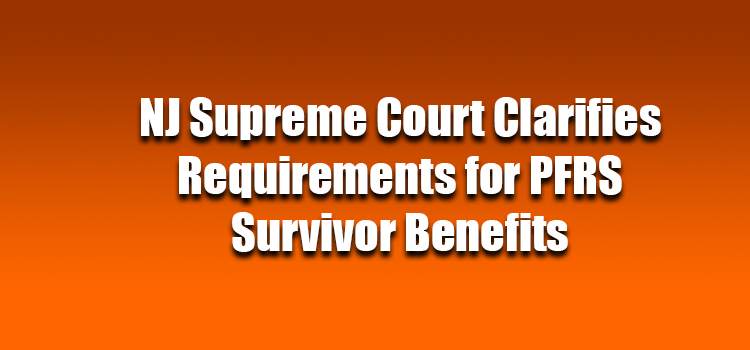In S.L.W. v. New Jersey Division of Pensions and Benefits, the Supreme Court of New Jersey held that children of Police and Firemen’s Retirement System (PFRS) members are not required to meet a dependency requirement to be entitled to survivor benefits. According to the court, its conclusion is consistent with the PFRS’s underlying policy goal of financially protecting the family members of its deceased members.

Legal Background
Under N.J.S.A. 43:16A-12.1, when members of the Police and Firemen’s Retirement System (PFRS) die after retirement, their children and widowed spouses are eligible to receive survivor benefits. N.J.S.A. 43:16A-1(21)(d) defines a “child” eligible for survivor benefits as a deceased member’s or retirant’s unmarried child “of any age who, at the time of the member’s or retirant’s death, is disabled because of an intellectual disability or physical incapacity, is unable to do any substantial, gainful work because of the impairment and [her or] his impairment has lasted or can be expected to last for a continuous period of not less than 12 months, as affirmed by the medical board.”
The PFRS statute includes an enabling clause allowing the State Treasurer to “promulgate any rules and regulations necessary to accomplish the purposes of this act.” N.J.A.C. 17:4-3.7 provides: “Proof of dependency shall be established by the filing of an affidavit of dependency, supported by the deceased and the claimant’s income tax returns, for the period immediately preceding the death or accident.”
Facts of S.L.W. v. New Jersey Division of Pensions and Benefits
Plaintiff S.L.W., an adult woman with disabilities, sought survivor benefits after her father, a longtime member of the New Jersey law enforcement community, passed away in 2012. As detailed in court documents, S.L.W.’s father retired after a long career in law enforcement and began receiving pension retirement benefits from PFRS. S.L.W. also worked in law enforcement until 2008 when a drunk driver plowed into her patrol car while she was on duty. Her injuries led to her physical disability and, concurrently, her inability to work. Going forward, S.L.W. relied on her father for upwards of 90% of her living expenses but indicated on her income taxes that no one could claim her as a dependent.
S.L.W.’s father died in June 2012. About a year and a half later, she submitted an application for survivor benefits under his pension plan. In late June 2014, the New Jersey Division of Pensions and Benefits(Division) informed S.L.W. that she did not meet its interpretation of the word “child” for PFRS purposes because she had been emancipated and employed prior to her disability. The letter concluded that, even if the Division’s interpretation of “child” was incorrect, S.L.W. was still bound to prove dependency under N.J.A.C. 17:4-3.7.
In July 2014, S.L.W. filed a letter-appeal with the PFRS Board of Trustees (Board) disputing the Division’s explanation that she must provide tax returns showing her father had claimed her as a dependent. The Board held a hearing on the matter in early August 2014 and decided S.L.W. did not qualify for survivor benefits. Nevertheless, the Board referred the matter to the Office of Administrative Law for an evidentiary hearing.
An Administrative Law Judge (ALJ) concluded S.L.W. did not qualify as a “child” under N.J.S.A. 43:16A-1(21)(d) and dismissed S.L.W.’s appeal. In November 2016, the Board adopted the recommendations of the ALJ. S.L.W. appealed the Board’s decision. The Appellate Division agreed with the ALJ’s determination that S.L.W. did not properly establish dependency but found that S.L.W.’s emancipation did not disqualify her as a “child” under N.J.S.A. 43:16A-1(21)(d).
Court’s Decision in S.L.W. v. New Jersey Division of Pensions and Benefits
The New Jersey Supreme Court held that the Legislature did not intend for children of PFRS members to meet a dependency requirement to receive survivor benefits. In support, it cited the PFRS statute’s plain language and legislative history.
The court also noted that in Saccone v. PFRS, 219 N.J. 369 (2014), it previously “recognized strong public policy favoring the financial protection of a public employee’s family,” including protecting “a public employee’s ability to provide adequately for the well-being of his disabled child after his death.” Accordingly, in that case, the court concluded, “the survivor benefits statute, like the entire PFRS pension scheme, should be interpreted in light of its remedial character. The statute should be construed in a manner that furthers its fundamental purpose.”
With regard to of N.J.S.A. 43:16A-1(21)(d), the court emphasized that the “literal reading” supports S.L.W.’s argument: the plain language definition of “child” makes no mention of any dependency requirement for survivor benefits. “The PFRS’s survivor benefits statute manifests a strong commitment to the financial well-being of a deceased PFRS member’s or retirant’s surviving spouse and children,” the court wrote. “Correspondingly, the inclusion of N.J.S.A. 43:16A- 1(21)(d), specifically providing for children with disabilities and impairments that inhibit a child’s ability to work, demonstrates the PFRS scheme’s desire to use the delayed compensation benefits earned by members of PFRS to support their family members with disabilities. We see nothing in the statute’s plain language that requires the Division to limit those protections.”
The court further noted that the legislative history supports its finding. “The history of the family member definitions and the present-day plain language of those definitions demonstrate that the Legislature knows how to impose a clearly defined dependency requirement when it so desires,” the court wrote. “So, it is implausible to impute a dependency requirement to qualify as a child when the law expressly outlines that requirement only for parents. We decline to conclude the statute’s definition of child holds any implied, presumed, or suggested dependency requirement.”
Because the court couldn’t find S.L.W. eligible for survivor benefits as she has not yet had the opportunity to prove she meets all the requirements for those benefits, it remanded the case to determine whether S.L.W. is otherwise eligible for survivor benefits.
